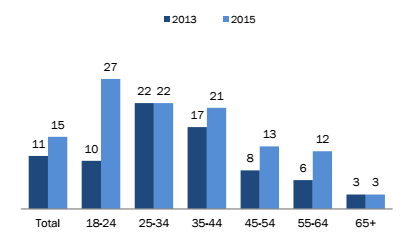Remember when meeting a romantic partner off the internet indicated you were somehow socially deficient? It was a hush-hush thing that everyone did. Definitely the elephant in the room. You’d show up one day at a wedding with a new girl (or guy) on your arm, and whenever someone asked you how you met, you’d flub it off with a canned answer like ‘at work’ or ‘at school’ when the reality is you met in a html chat on the far side of the internet.
Nowadays, nobody gives a shit. It’s considered a norm now as more than 30% of college age couples admit to using apps like Tinder, Grindr and Bumble to find love. That said, apparently love is still hard to find. I haven’t been on the market in over a decade so I don’t exactly have a dog in this fight, but I don’t remember it being a cakewalk.

If it were, then companies like Match.com wouldn’t need to exist and they wouldn’t be getting sued by the Federal Trade Commission (FTC) for taking advantage of the emotions of lonely people searching for love.
Match Group (MTCH.Q), which owns Tinder, OKCupid, PlentyOfFish, and other dating sites, is getting sued for using fake love interest advertisements to lure hundreds of thousands of consumer into purchasing paid subscriptions.
That’s not it, though.
The agency alleges that Match has exposed its consumer base to substantial fraud risk, and engaged in other allegedly deceptive and unfair practices. For example, they made false promises of ”guarantees” and then failed to respond to disputed charges, and the time honoured tradition of putting as many roadblocks up as possible in front of users looking to cancel their subscriptions.
“We believe that Match.com conned people into paying for subscriptions via messages the company knew were from scammers. Online dating services obviously shouldn’t be using romance scammers as a way to fatten their bottom line,” said Andrew Smith, Director of the FTC’s Bureau of Consumer Protection.
Match’s deal is that they let you build a free profile but restrict responding to other members to a paid subscription. The FTC’s complaint contends Match sent emails to nonsubscribers from fake accounts indicating that someone had taken an interest, and of course if they wanted to respond they would need to upgrade.
Specifically, when nonsubscribers with free accounts received likes, favorites, emails, and instant messages on Match.com, they also received emailed ads from Match encouraging them to subscribe to Match.com to view the identity of the sender and the content of the communication.
Then when they finally get past they paywall they find a scammer waiting for them.
It’s one of the many downsides of the new digital age—there’s always some asshole waiting to prey on the weak willed and desperate.
They’re throughout social media like a cancer. Random ‘hot chicks’ show up on my facebook account showing no mutual friends with pictures stolen from model sites. The first time it happened, I let it slide for a bit (without accepting their friend request) and checked in on them to see what they were all about. It wasn’t long before they started hitting me up for money, which was what I’d expected. The practice has since been duplicated on skype, with two separate random poor hairdressers from Paris who promise all manner of gratification in exchange for … we never got that far before I brought the banhammer down.

But other people in more vulnerable positions may be more susceptible; in fact, you can bank on it. Scammers certainly do.
Here’s the FTC:
Hundreds of thousands of consumers subscribed to Match.com shortly after receiving communications from fake profiles. According to the FTC’s complaint, from June 2016 to May 2018, for example, Match’s own analysis found that consumers purchased 499,691 subscriptions within 24 hours of receiving an advertisement touting a fraudulent communication.
The Commission’s Consumer Sentinel complaint database received more than 21,000 reports about romance scams for a total loss of $143 million in 2018.
Wait, it gets worse…
One of the draws for new customers was the promise of a free six-month subscription if they didn’t meet someone special, but it came with some relatively curious criteria that wasn’t disclosed anywhere on the site or in the contract.
Specifically, the FTC alleges Match failed to disclose adequately that consumers must:
- Secure and maintain a public profile with a primary photo approved by Match within the first seven days of purchase;
- Message five unique Match.com subscribers per month; and
- Use a progress page to redeem the free six months during the final week of the initial six-month subscription period.
Finally, getting away from this company turned out to be a nightmare. The FTC contends that Match violated the Restore Online Shoppers’ Confidence Act by not making it easy to stop the recurring charges from landing on credit cards, debt cards, bank account or other financial accounts.
That’s recurring monthly charges for a service you hate and don’t use because the stress of closing out the account is too frustrating.
As if love wasn’t hard enough to find.
Now if you’ll excuse me, I’m going to go hug my wife.
—Joseph Morton


